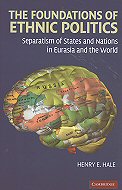The foundations of ethnic politics :
separatism of states and nations in Eurasia and the World
|
|
Henry E. Hale.
|

|

Despite implicating ethnicity in everything from civil war to economic failure, researchers seldom consult psychological research when addressing the most basic question: What is ethnicity? The result is a radical scholarly divide generating contradictory recommendations for solving ethnic conflict. Research into how the human brain actually works demands a revision of existing schools of thought. At its foundation, ethnic identity is a cognitive uncertainty-reduction device with special capacity to exacerbate, but not cause, collective action problems. This insight leads to a new general theory of ethnic conflict and nationalism that can improve both understanding and practice. Supporting this claim is a wide-ranging discussion of patterns in secessionism, international integration, state collapse, race relations, and deadly ethnic violence found across the globe. Special attention is paid to an in-depth case study of national in Eurasia, Which produces a major reinterpretation of nationalism’s role in the USSR’s breakup and interstate relations in the Commonwealth of Independent States.
Henry E. Hale (Ph.D. Harvard 1998) is Assistant Professor of Political Science and International Affairs at George Washington University. His work on ethnic politics, regional integration, democratization, and federalism has appeared in numerous journals, ranging from Comparative Political Studies to Europe-Asia Studies to Orbis. His first book, Why Not Parties in Russia? Democracy, Federalism, and the State (Cambridge University Press, 2006), received the Leon D. Epstein Outstanding Book Award from the Political Organizations and Parties section of the American Political Science Association (APSA). His "Divided We Stand: Institutional Sources of Ethnofederal State Survival and Collapse" (World Politics, 2004) won the APSA Qualitative Methods section's Alexander L. George Award.
|
|
